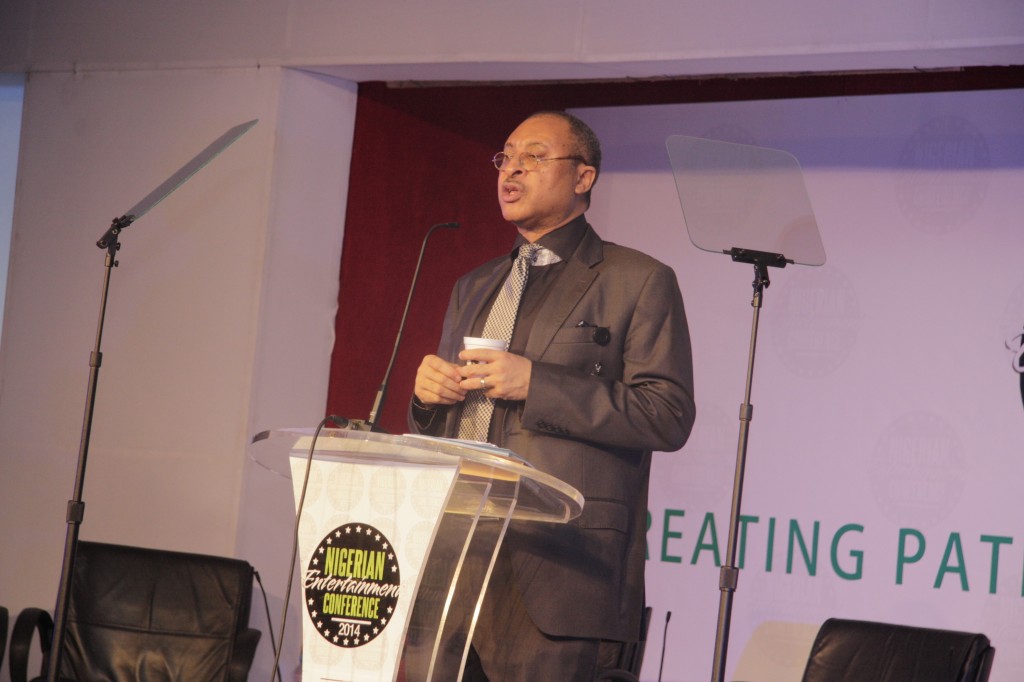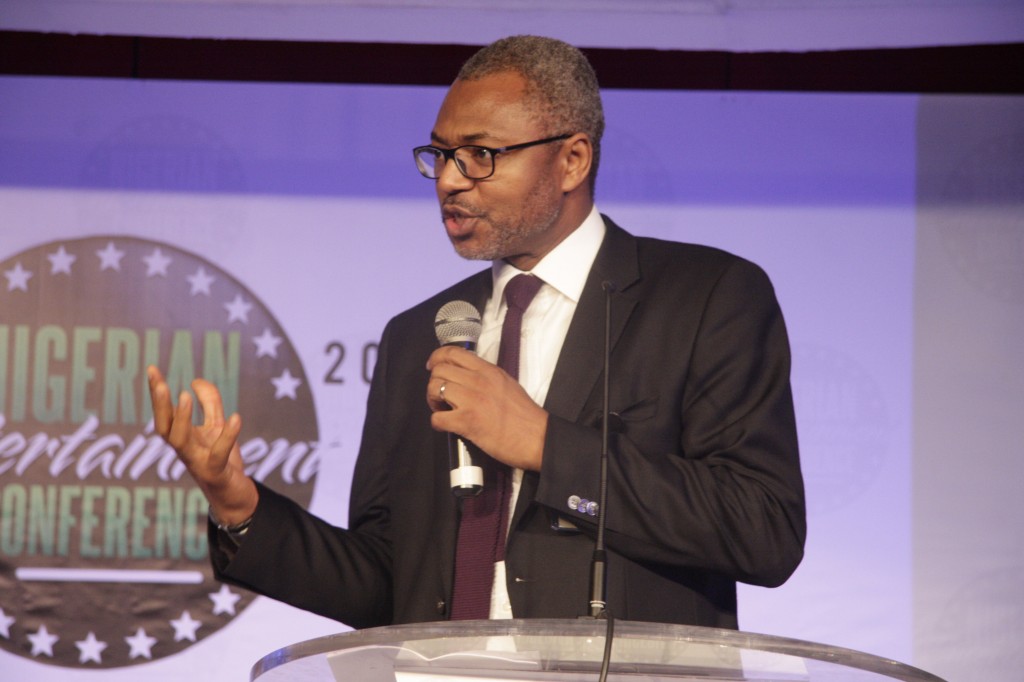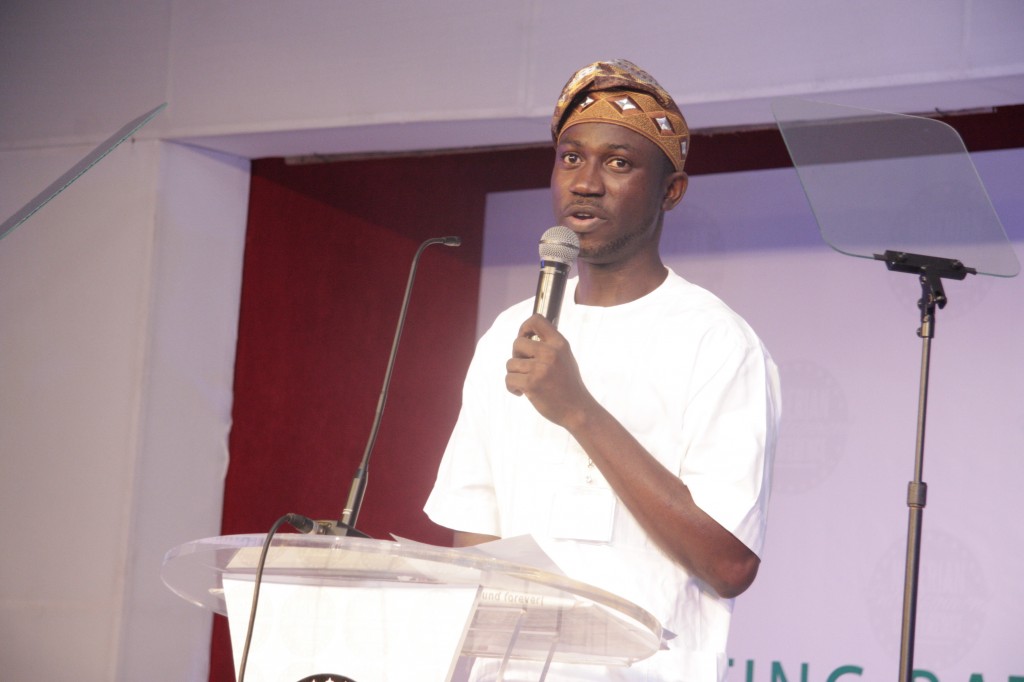The second edition of Nigerian Entertainment Conference (NEC) held on Wednesday 23rd April 2014 at the Grand Ball Room of the Eko Hotel & Suites, Lagos – Nigeria with the theme ‘Creating Pathways to the Future’.
In attendance at the one-day conference were session speakers, panelists, stakeholders and enthusiasts of the Nigerian entertainment industry. Plenary sessions at the second edition of NEC 2014 included Music, Nollywood, Business, Media, Information Technology (IT) and Social Responsibility.
The conference began with confirmation of registered delegates and Ayeni Adekunle – Chairman of Nigerian Entertainment Conference (NEC) delivered a notable welcome address calling for holistic review of problems challenging the entertainment industry in Nigeria. The conference hoped to identify pathways to move the industry forward by creating pathways to the future.
The annual Nigerian Entertainment Conference (NEC) is hosted under the auspices of Nigerian Entertainment Today, a weekly newspaper, which celebrated its 4th year anniversary along with the second edition of NEC.
KEY SPEAKERS AT SESSIONS OF THE CONFERENCE INCLUDED:
Professor Pat Utomi who spoke on ‘SOLVING THE DISTRIBUTION PROBLEM ONCE AND FOR ALL’ highlighted the need for stakeholders to embrace relevant structures leading to the effective distribution of property created by the Nigerian entertainment industry.
Multi-award winning musician 2face Idibia gave a trajectory presentation for the support by the industry to make collective rights management succeed in Nigeria. His paper was titled, ‘SLAYING THE COLLECTIVE RIGHTS MONSTER’ and it was presented during the session on Music.
Director General of the National Broadcasting Commission (NBC) Emeka Mba led conversations during the Nollywood session with his paper on ‘BUILDING A SUSTAINABLE NOLLYWOOD INDUSTRY’. He pointed out that the role of digital revolution taking over the global film industry is bringing about a paradigm shift. Therefore, practitioners must recognize that ‘the old order in Nollywood is fast changing’.
The Social Responsibility session graced a collection of personalities, celebrities and social service advocates. International humanitarian ambassador and actress, Omotola Jalade- Ekeinde initiated discuss for that session with her talk titled- ‘WHY WE SHOULD CARE’. She emphasised on the need for discipline by stakeholders in the entertainment industry.
Others included conversations around Information Technology – ‘Using IT for intervention’ and the Media session, which focused on ‘whose content is it anyway?’ The sessions all had experienced team of panellists.
THE 2014 CONFERENCE HIGHLIGHTED THE FOLLOWING AS CONTAINED IN A POSITION PAPER RELEASED BY NEC:
- The Nigerian entertainment industry is grossly impoverished and will continue to be in very bad shape if pertinent issues are not properly identified and promptly resolved.
A fundamental challenge in the industry is lack of established structures that will assist with full exploitation of potentials the industry has to offer both developed and emerging markets.
- Piracy remains at the fore of issues seeking urgent attention to put the Nigerian entertainment industry in proper perspective. Pirated copies of works produced by artistes, filmmakers and authors will continue to glisten freely on streets of the country without caution as the enforcement of piracy act remains weak. Nigeria could be losing more than USD$2billion to piracy every year. The government and related agencies responsible for the adequate protection of intellectual property are expected to take more stringent and proactive measures.
- Intellectual Property (IP) owners need to be better enlightened about their rights, IP protection laws and become actively involved in building the structure that will secure their works also making rights collection as well as remittance a fairly easy process.
- Funds injected by the government to further develop the industry especially the movie sector have failed to yield the desired impact. It was identified that lack of an efficient distribution network will continue to plaque the industry. Rather, funds that are injected as support grants should be deliberately used to set up an effective distribution structure. At present, stakeholders find it very difficult to access the government funds.
- The initiations of alternative distribution platforms are being created to serve the interest of both content owners and consumers of products from the Nigerian entertainment industry. However, pricing for the delivery of products ordered by consumers on these alternative distribution platforms remain debatable.
- An effective distribution structure will to a large extent eliminate piracy, which is currently bedevilling the industry. The structure is about combining what works in Nigeria where consumers can make an order that has either or not been released and the entertainment content is delivered at the consumer’s convenience. It creates easy access, broader reach to consumers and guarantee product quality that is being delivered.
- Creating and sustaining a distribution structure should capture essential data for every activity recorded including sales, delivery, cost and profit margins. These fundamentals are visible in a structured environment and will position the industry as accountable, making it a more viable sector. It will invariably attract investment opportunities to the industry as structured Return on Investment (ROI) will be guaranteed to stakeholders.
- Nigeria’s collective rights management is in disarray and has been described as a ‘monster’ that must be slayed to attain a harmonised form of royalty payment. Right owners form a basis for the existence of content used by media houses, especially music, and royalties of every artiste must be paid. However, the Collective Management Organisation (CMO) has put the industry in a situation where the interest in royalty collection is perceived as an individual interest rather than in the industry’s interest. This perception must be corrected. This can only be done when the different bodies collaborate by setting a common goal for the good of the thriving entertainment industry in Nigeria.
- World Music Day on September 1, 2009 marked the beginning of the change process for collective rights in Nigeria. For the first time, some practitioners came together to discuss future of collective rights, calling a truce among music bodies, which had hitherto not agreed on a collective process. This initiative signified the registration by Nigeria Copyrights Commission, the formal introduction of COSON in 2010, a body saddled with responsibility to collect royalties on behalf of rights owners.
- It is advised that artistes and music executives/ administrators take out the time to understand processes involved with collective rights management. Lack of knowledge or poor understanding of benefits that are associated with a strong collective rights society has been bane for misinformation in the Nigerian entertainment industry. However, the collective rights management is expected to be proactive with sensitizing members of the public on its activities.
- Every organisation including the broadcasting sector in use of materials or works of artistes/ talents in the Nigerian entertainment industry must fully comply with the remittance of royalties. Non-compliance or refusal by the organisations within identified sectors to pay royalties on the use of rights should be met with stringent penalties. Penalties that are enforced by the law of the Federal Republic of Nigeria.
- The National Broadcasting Commission and other associated bodies should mediate in the face-off between COSON (Collective Society of Nigeria) and Broadcasting Organisation of Nigeria (BON)/ Independent Broadcasters Association of Nigeria (IBAN) – the bodies representing broadcasters. Resolving the lingering issues between these bodies will help to promote fairness and adequate protection of rights’ owners.
- As matter of duty, COSON must never overlook the need to act responsibly at all times, to demonstrate the highest level of responsibility, accountability and transparency in the conduct of licensing, collection and distribution of collective rights in order to engender trust and good will of the music society and in the interest of the larger industry.
- Optimism about building a world-class collective management system can be achieved, only if all stakeholders eliminate putting personal interest over the collective good and benefits to the industry.
- It is important to caution that collective administration will face a tough challenge due to rapid technological advancement. The copyright system is being confronted to answer to the demands of the digital age in a manner that may render the current collective format obsolete.
- Recognising the pivotal role technology and digital applications play in today’s human existence, collective rights management and every aspect of the entertainment industry should offer considerable investment in digital rights management. It is noted that survival of any structure created for the development of the Nigerian entertainment industry will depend largely on the immediate response to both digital and industry dynamics in operation.
- Digital technology is democratising access to content creation and distribution. It is even making it easier for the near elimination of barriers to enter the market. The digital democracy is revolutionising the industry. It is creating an absence of industry peer review mechanisms that must be guarded against with extreme caution.
- The convergence of media, technology and entertainment is reinventing a brand new industry. Convergence has brought co-creation mechanisms between content originators, creators and users who freely inject a new kind of intensity and individuality in the creative flair.
- To move the Nigerian entertainment industry beyond the status quo, a focused re-orientation and new mentality is required. Experience combined with critical skills is essential for a viable and sustainable industry of the future. People in the industry must not be afraid to learn from the best global practices and earnestly avoid information hoarding.
- Some practitioners are not aware of the ‘language of film’. The Nigerian movie industry, Nollywood, should grow beyond the use of basic narratives but have a proper understanding of cinematic codes. It would be near impossible to construct a new dimension of reality if the elements required to build a structured visual narrative is lacking.
- The use of visual storytelling and employing the power of visual narratives can be used to construct a new reality for the Nigerian entertainment industry. The government of Nigeria may also capitalise on the new reality order of strong visual storytelling to rebrand the country’s image.
- It is important to acknowledge the impact of technology on storytelling and content creation across multimedia platforms. Today, audience and consumers are learning to search for and engage with content in more interactive and digital ways. The interaction extends across multiple users and creates digital tribes accessing the content. Therefore, the way a story is told and received is changing.
- There is an opportunity for advertisers and brand custodians to invest in creating a new storytelling experience. As content creation is changing, so are the dynamics for brand interaction with audience. Therefore a strategic synergy between both industries would positively impact on the development of the entertainment industry also boosting the economic viability of both sectors.
- New markets and opportunities continue to emerge with the introduction of digital devices. These devices require more integration of content and the entertainment industry should look to position itself to provide more local content that will appeal to consumers of these products.
- It means that new games, apps and entertainment content with an appeal for the consumers in various locations will be developed to take advantage of the technology. Invariably, there will always be a market and wholesome opportunities for creators and content owners to explore.
- The National Broadcasting Commission (NBC) identifies that the future is digital and is optimistic about the transition to digital broadcasting in Nigeria. NBC Director General, Emeka Mba affirms that digital broadcasting will usher audience variety and ultimate quality in television services. The industry will greatly benefit as the digital space opens up new revenue streams and redefine the existing broadcast media business models.
- It is opined that television content remains more popular and continues to grow in the advanced markets such as United States and Europe. Nigeria must utilise the key skills and resources available to secure an appreciable content consumer market. However, the necessary structures must be in place to grow the industry if it must meet best global practice.
- In conclusion, the industry is encouraged to establish effective and auditable distribution platforms. This will drive an interest towards the Nigerian entertainment sectors focusing on advances for exclusive licensing agreements for territorial distribution of music, movies and other forms of creative arts. Distribution territories may effectively extend to US, Europe, UK markets and parts of Nigeria.
- In other words, the Nigerian entertainment industry must birth a new industry that is distribution-led. The industry must depart from being production-led to creating structured deals and have properly defined marketing and business plans.
- Finally, it is important to involve other formal sectors into the business of entertainment. The insurance industry for instance can be involved to institutionalise completion bonds as part of the production process, serving as insurance cover that an actual production will be completed.
- The third edition of the Nigerian Entertainment Conference (NEC) will hold in April 2015.
—End of position paper—
Signed
Ayeni Adekunle Samuel
Chairman
08033438614







